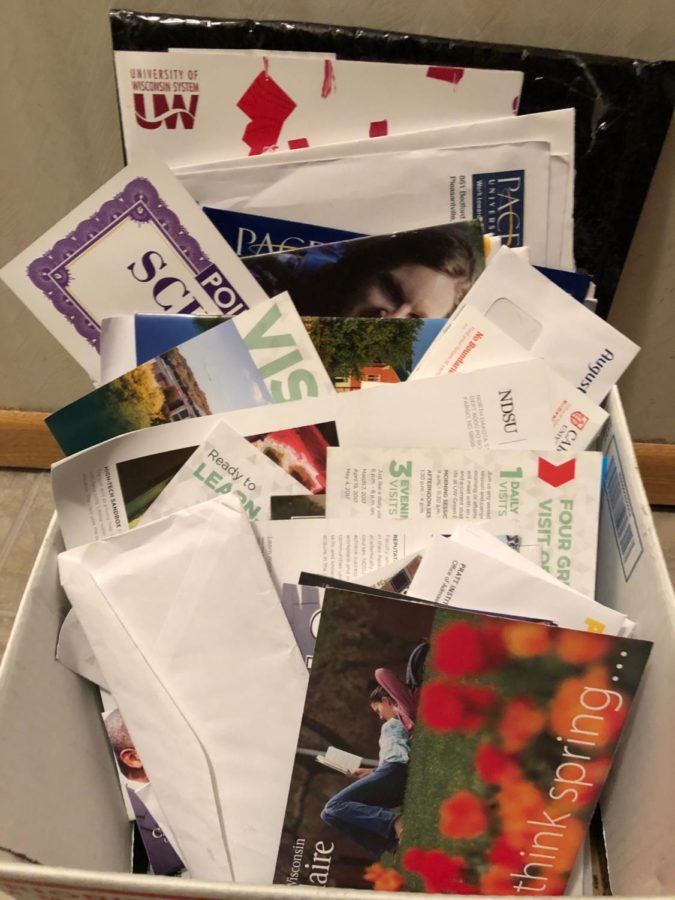Column: Too Much Mail
February 19, 2018
As seniors decide their fate and send in their college deposits, mail continually floods their inbox from various institutions. The same few phrases haunt shredders, garbage cans, even closets. “We can help you soar higher!”, “Do you have what it takes?” and “Jumpstart your future” cause teens to question their post-NHS plans.
That being said, students cannot put all the blame on colleges. Understandably, some do not read the fine print on standardized tests, checking boxes and coloring bubbles like it is the main exam. One prompt determines the fate of the mail-deliverer: May the ACT and SAT send information to universities?
According to College Confidential, if a certain university is looking for a female with over a 30 on the ACT, the university utilizes student search services to target anyone who fits the criteria. Of course, certain universities welcome anyone with a beating heart. It is not uncommon to hear students discussing the latest mail — since nearly all come home from school to see the same stationary.
The College Board states that most institutions using their service take notice of GPA, date of graduation and intended major. Oddly enough, students get letters from schools who do not even have their designated major. Instead, the admissions counselors offer me something on the opposite side of my interests.
Students can rest easy knowing that the College Board does not sell information to test-preparation companies, according to collegeboard.org. Notably, they do sell information to those sending out mail like candy on Halloween. Universities pay 42 cents to the College Board per requested name, The Washington Post reports. Are kids who will be dishing out thousands in a few years worth a mere 42 cents?
Connoisseurs of mail jump on the opportunity to receive letters with their names stamped across the envelope. For weeks they feel flattered, especially upon receiving a postcard close friends did not. Just a few short months after taking the PSAT, however, many see past the smoke and mirrors. “Here’s a letter from a college I don’t want to attend” becomes a common phrase as teens toss another rectangular piece of card stock on the growing pile.
While brochures and postcards can be great to broaden horizons and take notice of unfamiliar schools, they can also diminish confidence, mislead prospective students and overrun homes.



Jaden A Mikoulinskii • Mar 2, 2018 at 1:11 PM
Wow! That sure is a lot of college mail! I am particularly in favor of the UW-Eau Claire mail that is in your bucket 🙂 I was very surprised to read that College Board sells student information to universities! I suppose that they do have to find income through a variety of outlets, but I wonder if colleges even feel it worth the cost. Every penny counts, right?
I’m curious to know more about the data surrounding this topic. What percent of students actually respond to the mail sent by colleges? How many colleges make these agreements with College Board? How many students actually elect to receive mail from various schools on their ACT? Does the SAT also offer this option to it’s test takers?
So many questions, so little time. Great article, Emily!
Erin Schubin • Feb 22, 2018 at 10:05 PM
Senior year is full of important life decisions: Do I know what I want to do with the rest of my life? Where do I want to go to college? Are the thousands of dollars of student debt worth it? On Emily Robert’s point, I would have to agree that college mail makes college choices somewhat confusing and, at best, are a constant annoyance like a multitude of buzzing flies in your ears. I was surprised to hear the statistic on College Board being paid to give out names, however, for the 42 cents per name. Because, in reality, I don’t believe the multitude of college mail makes a large margin of difference in a student’s choice, for me at least. High school seniors are at an integral point in determining the rest of their lives and it is certainly up for debate whether college mail is a turning point in the mind of a high school senior.